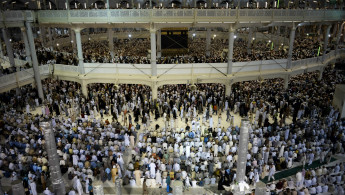Egypt warns Hajj pilgrims against making 'political statements'
Cairo has demanded that Egyptian pilgrims and guides make no political statements during next month's Hajj pilgrimage to Mecca.
2 min read
No politics, just pilgrimage say the Egyptian government [AFP]
Egypt has warned pilgrims and religious guides heading to Mecca to perform Hajj next month, not to make any political statements during the festival.
The ministry for religious endowments demanded that sheikhs - or Muslim leaders guiding pilgrims through rituals - perform only religious tasks and to stay away from any "controversial matters".
"All pilgrims in general, particularly Egyptian pilgrims, should should not engage in any political [acts] during pilgrimage and dedicate themselves full-time to obedience, worship, acceptance, compassion and forgiveness," the statement added.
Pilgrims often take photos of themselves in Mecca's holy sites carrying signs with political statements and sharing them on social media.
In the past, Iranian pilgrims have also took part in demonstrations, leading to clashes and subsequent massacres of worshippers by Saudi security services.
Saudi Arabia takes a hardline against organised political expression, even outside Hajj season.
According to an official source in the ministry, there are around 80 "sheikhs" expected to accompany Egyptian pilgrims to Saudi Arabia this year.
Egyptians made up the largest nationality of pilgrims during 2014's Hajj, with over 67,000 traveling to holy sites in Mecca for the annual religious festival.
Since 2013, Egyptian authorities have led crackdown on religious leaders and movements that oppose authoritarian Egyptian ruler President Abdel Fattah al-Sisi.
He came to power after removing Egypt's first democratically-elected president - Mohamad Morsi - and his Muslim Brotherhood government.
The 2013 military coup was backed by religious authorities, including al-Azhar's Grand Sheikh Ahmed el-Tayeb. The Cairo based position was once considered a spiritual head for Egyptian Muslims, but now viewed as an extension of the governmemt.
Shortly after the coup, 55,000 Egyptian preachers who were not approved by al-Azhar were fired.
Most of these were accused of being sympathetic to the now banned Muslim Brotherhood, which has since gone underground as thousands of the movement's supporters languish in dungeons or on death row.
In July, the Egyptian government demanded that Muslim clerics read pre-written regime-approved sermons to worshippers during Friday prayers across the country.
The Hajj is a religious obligation for all Muslims who are fit enough to carry out once in their lives.
The ministry for religious endowments demanded that sheikhs - or Muslim leaders guiding pilgrims through rituals - perform only religious tasks and to stay away from any "controversial matters".
"All pilgrims in general, particularly Egyptian pilgrims, should should not engage in any political [acts] during pilgrimage and dedicate themselves full-time to obedience, worship, acceptance, compassion and forgiveness," the statement added.
Pilgrims often take photos of themselves in Mecca's holy sites carrying signs with political statements and sharing them on social media.
In the past, Iranian pilgrims have also took part in demonstrations, leading to clashes and subsequent massacres of worshippers by Saudi security services.
Saudi Arabia takes a hardline against organised political expression, even outside Hajj season.
According to an official source in the ministry, there are around 80 "sheikhs" expected to accompany Egyptian pilgrims to Saudi Arabia this year.
Egyptians made up the largest nationality of pilgrims during 2014's Hajj, with over 67,000 traveling to holy sites in Mecca for the annual religious festival.
Since 2013, Egyptian authorities have led crackdown on religious leaders and movements that oppose authoritarian Egyptian ruler President Abdel Fattah al-Sisi.
He came to power after removing Egypt's first democratically-elected president - Mohamad Morsi - and his Muslim Brotherhood government.
The 2013 military coup was backed by religious authorities, including al-Azhar's Grand Sheikh Ahmed el-Tayeb. The Cairo based position was once considered a spiritual head for Egyptian Muslims, but now viewed as an extension of the governmemt.
Shortly after the coup, 55,000 Egyptian preachers who were not approved by al-Azhar were fired.
Most of these were accused of being sympathetic to the now banned Muslim Brotherhood, which has since gone underground as thousands of the movement's supporters languish in dungeons or on death row.
In July, the Egyptian government demanded that Muslim clerics read pre-written regime-approved sermons to worshippers during Friday prayers across the country.
The Hajj is a religious obligation for all Muslims who are fit enough to carry out once in their lives.





 Follow the Middle East's top stories in English at The New Arab on Google News
Follow the Middle East's top stories in English at The New Arab on Google News
![The UAE is widely suspected of arming the RSF militia [Getty]](/sites/default/files/styles/image_330x185/public/2024-11/GettyImages-472529908.jpg?h=69f2b9d0&itok=Yauw3YTG)
![Netanyahu furiously denounced the ICC [Getty]](/sites/default/files/styles/image_330x185/public/2024-11/GettyImages-2169352575.jpg?h=199d8c1f&itok=-vRiruf5)
![Both Hamas and the Palestinian Authority welcomed the ICC arrest warrants [Getty]](/sites/default/files/styles/image_330x185/public/2024-11/GettyImages-2178351173.jpg?h=199d8c1f&itok=TV858iVg)